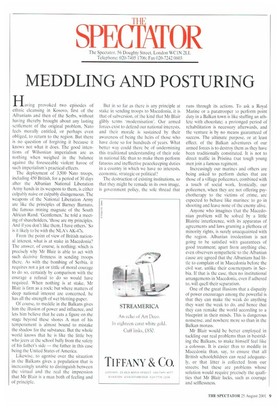MEDDLING AND POSTURING
Having provoked two episodes of ethnic cleansing in Kosovo, first of the Albanians and then of the Serbs, without having thereby brought about any lasting settlement of the original problem. Nato feels morally entitled, or perhaps even obliged, to return to the region. But there is no question of forgiving it because it knows not what it does. The good intentions of Wilsonian imperialism are as nothing when weighed in the balance against the foreseeable violent havoc of such imperialism's practical effects.
The deployment of 3,500 Nato troops, including 450 British, for a period of 30 days after the Albanian National Liberation Army hands in its weapons to them, is either culpably naive or culpably disingenuous. The weapons of the National Liberation Army are like the principles of Barney Barnato, the famous mining magnate of the South African Rand. 'Gentlemen,' he told a meeting of shareholders, 'those are my principles. And if you don't like them,! have others.' So is it likely to be with the NLA's AK-47s.
From the point of view of British national interest, what is at stake in Macedonia? The answer, of course, is nothing; which is precisely why Mr Blair is able to act with such decisive firmness in sending troops there. As with the bombing of Serbia, it requires not a jot or tittle of moral courage to do so, certainly by comparison with the courage a refusal to do so would have required. When nothing is at stake, Mr Blair is firm as a rock; but where matters of deep national interest are concerned, he has all the strength of wet blotting-paper.
Of course, to meddle in the Balkans gives him the illusion of power and influence, and lets him believe that he cuts a figure on the stage beyond these shores A man of his temperament is almost bound to mistake the shadow for the substance. But the whole world knows that he is like the little boy who jeers at the school bully from the safety of his father's side — the father in this case being the United States of America.
Likewise, to agonise over the situation in the Balkans gives a population that is increasingly unable to distinguish between the virtual and the real the impression that Mr Blair is a man both of feeling and of principle. But in so far as there is any principle at stake in sending troops to Macedonia, it is that of subversion, of the kind that Mr Blair glibly terms 'modernisation'. Our armed forces exist to defend our national interests, and their morale is sustained by their awareness of being the heirs of those who have done so for hundreds of years. What better way could there be of undermining this traditional understanding of their role in national life than to make them perform fatuous and ineffective peacekeeping duties in a country in which we have no interests, economic, strategic or political?
The destruction of existing institutions, so that they might be remade in its own image, is government policy, the sole thread that runs through its actions. To ask a Royal Marine or a paratrooper to perform point duty in a Balkan town is like stuffing an athlete with chocolate; a prolonged period of rehabilitation is necessary afterwards, and the venture is by no means guaranteed of success. The ultimate purpose, or at least effect, of the Balkan adventures of our armed forces is to destroy them as they have been traditionally constituted. It is not to direct traffic in Pristina that tough young men join a famous regiment.
Increasingly our marines and others are being asked to perform duties that are those of a village policeman, combined with a touch of social work. Ironically, our policemen, when they are not offering psychotherapy to the victims of crime, are expected to behave like marines: to go in shooting and leave none of the enemy alive.
Anyone who imagines that the Macedonian problem will be solved by a little Blairite interference, with its apparatus of agreements and laws granting a plethora of minority rights, is surely unacquainted with the region. Albanian irredentism is not going to be satisfied with guarantees of good treatment; apart from anything else, even observers sympathetic to the Albanian cause are agreed that the Albanians had little to complain of in Macedonia before the civil war, unlike their counterparts in Serbia. If that is the case, then no institutional arrangements in Macedonia, even if adhered to, will quell their separatism.
One of the great illusions that a disparity of power encourages among the powerful is that they can make the weak do anything they want the weak to do. and hence that they can remake the world according to a blueprint in their minds. This is dangerous nonsense, and nowhere more so than in the Balkan morass.
Mr Blair would be better employed in tackling our real problems than in bestriding the Balkans, to make himself feel like a colossus. It is easier thus to meddle in Macedonia than, say, to ensure that all British schoolchildren can read adequately, or that litter is collected from our streets; but these are problems whose solution would require precisely the qualities that Mr Blair lacks, such as courage and selflessness.


























































 Previous page
Previous page